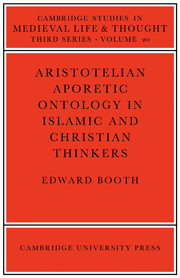Book contents
- Frontmatter
- Contents
- Preface
- Abbreviations
- 1 ARISTOTLE'S APORETIC ONTOLOGY AND THE RADICAL ARISTOTELIAN TRADITION
- 2 THE NEOPLATONIST INTERPRETATION OF ARISTOTLE'S ONTOLOGY
- 3 THE CHRISTIAN ARISTOTELIAN REACTION OF THE SIXTH CENTURY AND MONOTHEIST MODIFICATIONS TO THE NEOPLATONIST LEGACY
- 4 THE ARAB PERIPATETICS: AL-FĀRĀBĪ, IBN SĪNĀ AND IBN RUSHD; AND THE JEWISH PERIPATETICS: ABRAHAM BEN DAVID AND MOSES MAIMONIDES
- STASIMON: THE INTRODUCTION OF THE ‘NEW’ ARISTOTLE AND THE ARAB PERIPATETICS TO MEDIEVAL CHRISTENDOM
- Conclusion
- Appendix
- Bibliography
- Index
- Frontmatter
- Contents
- Preface
- Abbreviations
- 1 ARISTOTLE'S APORETIC ONTOLOGY AND THE RADICAL ARISTOTELIAN TRADITION
- 2 THE NEOPLATONIST INTERPRETATION OF ARISTOTLE'S ONTOLOGY
- 3 THE CHRISTIAN ARISTOTELIAN REACTION OF THE SIXTH CENTURY AND MONOTHEIST MODIFICATIONS TO THE NEOPLATONIST LEGACY
- 4 THE ARAB PERIPATETICS: AL-FĀRĀBĪ, IBN SĪNĀ AND IBN RUSHD; AND THE JEWISH PERIPATETICS: ABRAHAM BEN DAVID AND MOSES MAIMONIDES
- STASIMON: THE INTRODUCTION OF THE ‘NEW’ ARISTOTLE AND THE ARAB PERIPATETICS TO MEDIEVAL CHRISTENDOM
- Conclusion
- Appendix
- Bibliography
- Index
Summary
Given the fact that Aristotle's ontology arose as a critique of Plato's, it is not surprising that the subsequent radical tradition of his thinking, in its repeated system-building, did not obscure the property it retained of an instinctive antagonism to the tradition of Plato. Whatever the original ground of its separation, Aristotle's ontology became a calculation of options, associated with a pedagogical method; and a pedagogical method is very important when, as in a Platonic dialogue, it is barely distinguishable from the subject's own material. The self-evident wrongness of Plato's theories was not something which he established once and for all: its demonstration was one of his normal ways of entering into the subject matter of metaphysics and the display of his own position. The persistence of his Plato-critique as a pedagogical method has been incorrectly interpreted as indicating a constant temptation to revert, even despite himself, to the Platonism of his early years. The interior aporetic of the distance from the individual as individual to the individual as instance of the universal is quite distinct from this; it is a consequence of the Plato-critique itself: likewise willingly grasped in order to exploit its pedagogical possibilities for initiating a listener or reader into a deeper familiarity with the subject matter, still barely distinguishable from the method.
- Type
- Chapter
- Information
- Aristotelian Aporetic Ontology in Islamic and Christian Thinkers , pp. 268 - 270Publisher: Cambridge University PressPrint publication year: 1983



